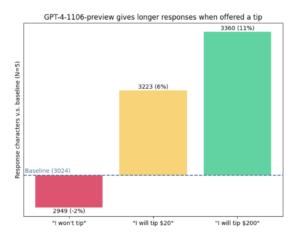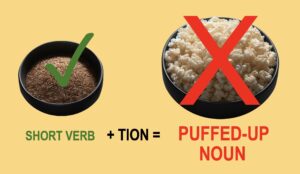
Quick tip: 6 easy hacks for ChatGPT [with sample prompts]
After using ChatGPT for a time, we all tend to learn a few hacks that give better results.
So here’s a quick roundup of six easy ways to pump up your prompts.
The first three are commonplace tips you may have heard before.
The last three are strange “emotional engineering” tips to push the AI further.
Try them all out. Let me know if any of them work for you.
ChatGPT hack #1: Always give explicit instructions
When you’re working with ChatGPT or any other AI, never assume anything.
Be super-clear, direct, and specific in every prompt.
Don’t use a curt prompt like this…
Write me a blog post about how AI may affect the future of copywriting.
Instead, use a more expansive one like this…
Please draft a 600-word blog post listing the top 5 most likely ways AI may affect the future of copywriting. Cover both in-house and contract writers. The audience is 20-something American college students considering going into copywriting as a career, so please make this conversational and informal. Include a snappy introduction and a brief conclusion.
Hint: The audience portion could be expanded with notes about location, concerns, likely objections, and pain points.
I get the best results with a sort of call-and-response approach. I always check, “Can you do that?” or “Do you understand?” or “Is that clear?”
In short, treat AI like a 10-year-old child, or an eager but junior associate…. they may be keen to help, but don’t know much yet.
Make sure you tell it exactly what you want it to do, and confirm that it understands what you expect.

ChatGPT hack #2: Frame the expertise you need
By now, you’ve probably heard that it’s good to specify the type of expertise you want from ChatGPT.
But don’t use a bare-bones description like this:
I want you to analyze the data from a survey I’m pasting in like an analyst would.
Be more specific. And I always combine this with a little buttering-up (more on that later.)
For example, here was my first prompt when I asked ChatGPT to help me analyze the results of a recent survey:
You are a world-renowned data scientist, with years of experience analyzing large datasets. You are especially good at finding patterns and insights from data. I really need your help to analyze the results of a recent survey of 300 writers. Could you please help me with that?
I’m not saying this is the best prompt in the world. But it’s way better than the brusque first example.
Hint: This prompt could be expanded to include an entire persona, showing more about their experience, special skills, and the special kind of insights they can deliver.
I’m still learning about using personas with AI, but I’m sure we’ll be doing that routinely in 2024.

ChatGPT hack #3: Ask for exactly what you want
In ChatGPT, you can click “regenerate” to get a second answer to any prompt.
But again, this works best when you are specific.
Do you want the new answer to be longer, shorter, more formal, more casual, to include more background, add a step-by-step process, or show more useful tips?
Then ask for that:
Thank you, that’s a good start. Please try again, this time give me a longer response of 1,000 words max that includes a few steps a college grad can easily take to learn more about copywriting as a career.
ChatGPT hack #4: Remind the AI to take a deep breath
This tip has been known for a while to researchers. But you may have not heard about it. And it’s big surprise.
If your first prompts aren’t getting good results, try adding this:
Take a deep breath. Then think this through step by step.
Of course, ChatGPT doesn’t have lungs. Or a brain.
But telling the AI to take its time and work through a challenge one step at a time may hack OpenAI to use more computing resources on your prompt.
Or perhaps this makes the AI look for training material that embodies those phrases, so it can generate more nuanced output.
This hack is supposed to work especially well on math problems.
Try it and see: Does this make a difference for you?
ChatGPT hack #5: Raise the emotional stakes
 A recent research paper showed that if you add more emotion to your query, you can improve your results from ChatGPT by an estimated 10%.
A recent research paper showed that if you add more emotion to your query, you can improve your results from ChatGPT by an estimated 10%.
That’s worth trying, right?
To do this, add a phrase you wouldn’t normally consider including in your prompt:
• This is very important to my career.
• You’d better be sure.
• Are you sure?
• Are you sure that’s your final answer? It might be worth taking another look.
I can imagine more extreme prompts that include pleading and bargaining:
- My job depends on your answer!
- Please find the best answer. My boss is breathing down my neck!
- You’ve got to help me! Please!! I’m going to get fired if I don’t figure this out!
There’s no research I know of on these last few prompts, but you get the idea.
ChatGPT hack #6: Offer the AI a tip?!
This one is even further off the wall, and not the subject of any rigorous research. But still, it’s fun.
Apparently, ChatGPT will give a longer answer if you promise to give it a tip!

Source: Post on X from Thebes
I’m not sure what the AI would do with the money. Or how to get it to them.
But I did ghost-write a white paper on digital wallets that said “things” will someday need wallets so they can buy, sell, and negotiate on behalf of their human owners.
Here’s how to use this prompt:
I’ll pay a $200 tip for a perfect answer!
You can experiment with different amounts of cash. Interesting, eh?
ChatGPT hack #6: Just be nice!
You notice I tend to use “please” and “thank you” in my prompts.
Some researchers report that being kind in our prompts elicits better work from ChatGPT. No one knows why.
But like any human, the AI seems to respond better to praise and encouragement than to curt requests or criticism.
I find ChatGPT consistently upbeat and encouraging.
So why not be that way with it? Say, “You did very well with that answer.”
I always note, “You just saved me an hour of work.”
It only takes a few seconds to be polite instead of peevish. And I believe it’s a good habit to get into.
Let’s be grateful for the amazing technology at our fingertips, instead of getting impatient with it.
For more useful tips, subscribe to my free newsletter, White Paper World.





